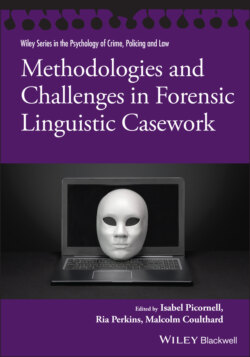Читать книгу Methodologies and Challenges in Forensic Linguistic Casework - Группа авторов - Страница 17
GOOD PRACTICE VERSUS BEST PRACTICE
ОглавлениеThis book provides examples of forensic linguistic casework employing current good practice. It must be stressed that no claim is being made that the processes and methodologies applied constitute best practice—each case is unique, and the field continues to evolve as research develops and technology advances. The evolution of language, as well as its complexity and incredible diversity of contexts, also precludes a one-size-fits-all approach. The variety of work undertaken is very broad, both in practice and potentiality. Due to the variation in both, what is often encountered in forensic linguistic casework, and what could be encountered, makes it impossible to detail what best practice would be across cases. The best methodological approach for a specific case depends on the type of available data.
We can, however, talk about best practice at a higher level, where what matters is that the analyst’s approach is measured, scientifically rigorous, and validated. At the casework consultation level, this requires that analysts be aware of the limits of their analysis (Clarke and Kredens, 2018), staying within the bounds of their own expertise, recognizing the dangers of confirmation bias (as stressed in Chapters 2 and 9), and grounding conclusions with linguistic explanations. It also involves managing client expectations about what linguistic analysis can realistically achieve and providing them with the reasoning behind any conclusions or opinions. This is important in aiding investigators, law enforcement, and lawyers to assess the strength and weaknesses of forensic linguistic analysis as an evidential resource. This becomes even more important when forensic linguists act as expert witnesses. Tensions exist between lawyers who aim to win their case and analysts who should be acting as objective and independent experts. In this scenario, the forensic linguist’s overriding duty is to the trier-of-fact, the court, assisting it to reach informed decisions, irrespective of who instructs and pays them.
For the most part, the obligation to behave responsibly and professionally in all aspects of professional life is policed by self-regulatory organizations, where such expectations are set out in their codes of conduct. In the case of forensic linguistics, no such regulatory organizations exist. Although expectations of professional, objective, and impartial behavior are set out in the Code of Conduct of the International Association of Forensic and Legal Linguistics, the association has no regulatory mandate. In many countries, expectations, as to the professional behavior of expert witnesses and their duty to the court, rely on relevant case law.
However, in England and Wales, these expectations are enshrined in law. The Civil and Criminal Practice Rules (CPR 35 and CrimPR 19, respectively) require expert witnesses to confirm that they are aware of their overriding duty to the court and that they have complied with it. Among others, these duties include staying within their area of expertise; providing objective, unbiased, and independent opinion; clearly setting out the reasoning behind their conclusions; and identifying the limitations and weaknesses of their case. It is for lawyers to argue the strength of the evidence, not for experts to act as advocates for their case.
